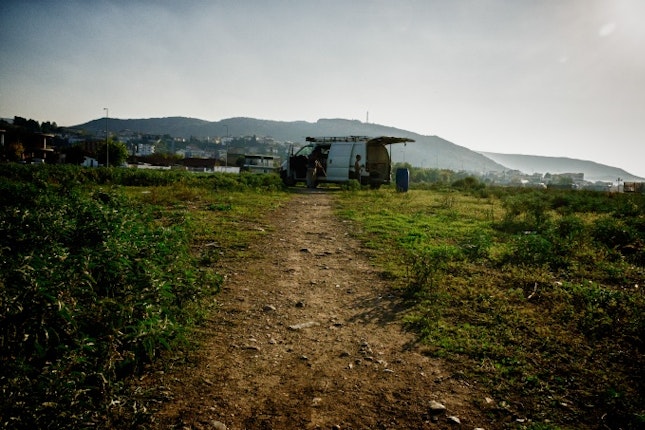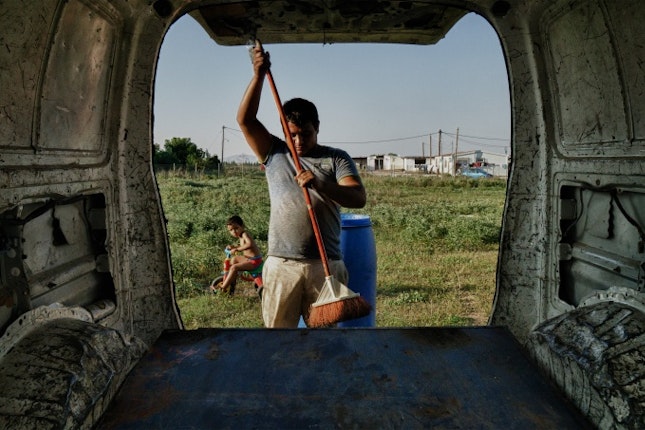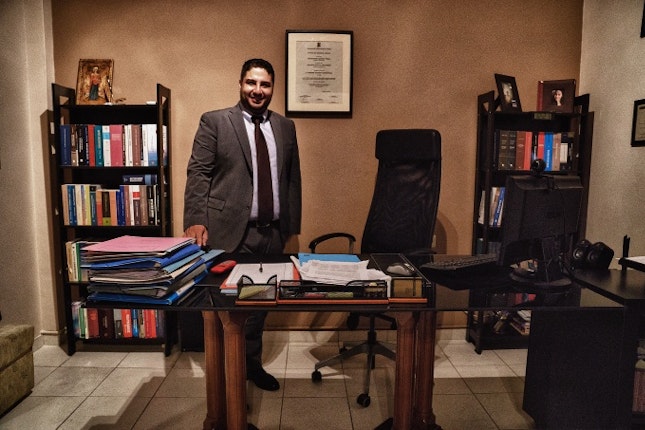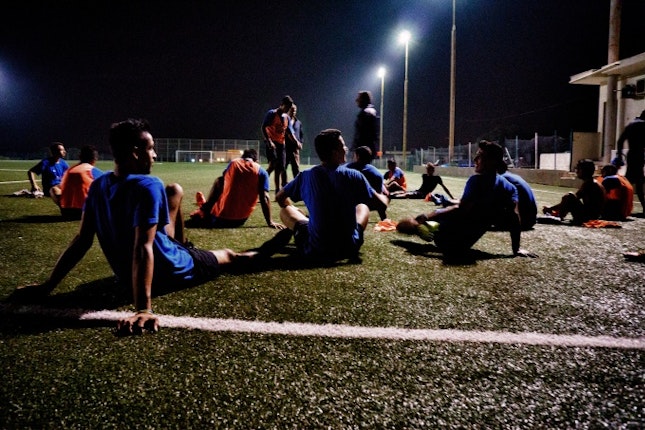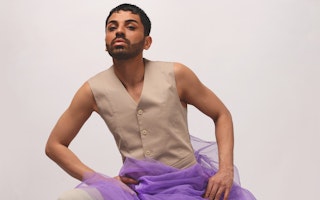Breaking News No More: Life for Roma in Greece a Year after “Maria”
By Nikolia Apostolou
In October 2013, the story of Maria, a blonde Roma girl living in Greece, made world news. A year later, the Open Society Foundations returns to Greece. Nikolia Apostolou posted this after visiting Athens, Corinth, and Farsala, where Maria grew up.
For Lefteris Konstantinidis, a 34-year-old lawyer, a normal day in his new office is busy. The phone rings often; he runs around printing new case files and continues to take on new clients. His schedule is exhausting, but he still enjoys his work.
On top of his job, Konstantinidis dedicates his out of work hours to helping out his own community: the Roma. He promised himself he would never stop helping his community—no matter how hard it is to balance the two worlds.
Like most Roma, Konstantinidis dropped out of school to start work when he was ten, but despite the hardship, he managed to fulfill his dream of becoming a lawyer.
“In my 20s, I started at the Second Chance School with a 15-year plan to finish junior high school, high school, law school, an internship, and the bar exams—all while holding a day job,” Konstantinidis said.
But Konstantinidis walked a lonely path—while he was studying, most of his friends dropped out of school and got married.
“At some point, I’d like it if I weren’t an exception,” said Konstantinidis talking about Roma’s access to education. “In Greece, the Roma have legal rights, but they do not have equal access to basic resources and that’s what we need to change.”
Prejudice and discrimination against the Roma in Greece is still strong.
Konstantinidis describes cases like those in Aspropyrgos, a suburb of Athens, where two classrooms were burnt after an announcement that the school would accept Roma children, or like the ones in the northern Greek town of Sofades, where parents staged a sit-in to protest the admittance of Roma children to the local school.
In October 2013, the police discovered a blonde-haired, blue-eyed girl named Maria at the Roma camp of Farsala in northern Greece. Maria was taken away from her family and the parents were arrested, although they told police that a Bulgarian Roma woman had given her to them because she was unable to raise the child herself.
In the weeks before the DNA results were released, the media vilified Greece’s Roma, playing into the tale of Roma kidnapping children who didn’t eat their dinners, often told by Greek parents to scare their children into behaving.
“The media in Greece have no ethics when they deal with the Roma. It’s like we’re in the Middle Ages of information,” said Eleni Tsetsekou who has worked for more than a decade with Roma populations around Europe at the Council of Europe.
“[The media] created panic in the Roma camps and they kept looking for blonde kids. If they knew the community at all they’d know that many Roma children are blonde. There’s a complete ignorance of Roma issues and a disinterest to learn about them. They’ve harmed an already vulnerable community and sent them further into the margins.”
The Roma are Europe’s largest and most marginalized minority group. They number 10 to 12 million, 250,000 of whom reside in Greece. According to a cross-Europe survey [PDF] conducted by the EU Agency for Fundamental Rights in 2012, more than 90 percent of Roma households live below the poverty lines of their respective countries. Only 15 percent have completed secondary education, while they have a 10-year shorter life expectancy, compared to the rest of the population.
Back in Farsala, the commotion died down and the media left after DNA tests proved Maria was indeed the child of a Roma Bulgarian woman. But the people of the camp are still struggling with subpar living conditions and illiteracy, due to decades of marginalization.
Panayiotis Karakostas is a 22-year-old Roma who supports his four children who are between the ages of one and seven years old. He has spent the day delivering scrap parts and now cleans the dust and dirt off of his old, damaged truck by the side of the camp. On Sunday, he’ll go buy some ceramic pots and try to sell those instead.
“I go out [for work] every day,” Karakostas said taking a break to smoke a cigarette. “I go to all the villages around here. I’ve been doing this since I was 10. Today, I make 20 to 30 euros a day, but it’s not enough.”
Things for Karakostas have become more difficult recently after a law was passed that requires a vendor’s permit to sell goods. It is a difficult license to get, as you need to pay around 500 euros every two months for healthcare and social security, plus taxes. Many Roma have no license.
“My brother-in-law was sitting next to a kiosk selling shoes,” said Karakostas. “He had five pairs and the police came to him and gave him a 5,000 euro fine and took his merchandise.”
Talking about the children’s future, Panayiotis’s wife, Maria, says the children are free to do what they decide. “We didn’t go to school and now what do we do?” Maria asked. “If you’re educated, life is different. When you’re illiterate your eyes are shut.”
Twice per week, a Roma soccer team meets for practice to prepare for a local tournament. They are not the well-known Roma F.C. from the Italian capital city, but Roma A.O. from Examilia, Corinthos, a small town about 90 kilometers from Athens. The team is made up of Roma between the ages of 14 and 20, all living in segregated camps.
The team started in early 2009 and has been going strong ever since, despite initial hurdles. “When we started there was blood on the ground in every training,” said Phillip Larsen, project developer of Children’s Ark, the NGO that founded and runs the team. “It took five years to get to this stage. I’m sure football has saved lives because it’s a very difficult age, in your teens, when you grow up in such a tense environment.”
During practice everyone listens to the coach and asks Phillip for pointers. The team is proud that it’s the only team in the local championship without any red cards.
Soccer has proven to be an important outlet for young Roma men like 17-year-old Dionusis Georgiou. “Life is a bit hard, but we’ve been conditioned to deal with it since we were young. There are a lot of problems here on top of all the poverty,” said Georgiou. “I dropped out of school in seventh grade. Soccer helps me deal with my stress,” he added.
The Roma soccer players feel that soccer has changed attitudes toward them. “The way people [in the town] see us has changed,” said Georgiou. “[Non-Roma locals] come to the matches, they talk about [our performance] and greet us in the street. All this time they considered us to be slower than them, but now we don’t have to deal with racism anymore.”
There are rays of hope in Greece for Roma but there is still much more to do. A 10-year-program, developed in cooperation with the Roma community and designed to tackle problems in education, health, housing, and employment, remains largely unimplemented by municipalities and national government. “If the state had the political will to fulfill this holistic program, today things would be different, and when we talk about Roma we wouldn’t only think of social marginalization and the horrible social and economic situation Roma are in,” said Konstantinidis.
A year after the story of young Maria, media attention has moved on; the legacy of last year’s events, a deeper and more damaging prejudice towards Roma. With or without the media glare however, there are still fresh stories to be told.
Nikolia Apostolou is a writer and filmmaker based in Athens, Greece, who has written on the impact of the financial crisis on Greece and co-directed a documentary on Golden Dawn.
